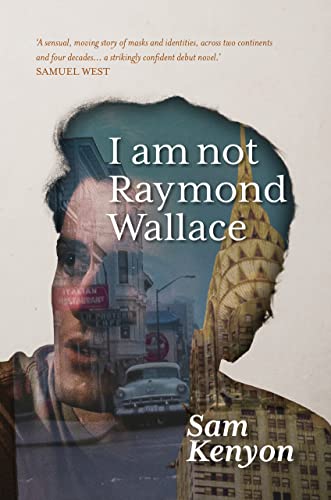 In this impressive debut, Sam Kenyon offers a painful meditation on lost opportunities and the grievous consequences of thwarted love. In prose that is as delicate as it is precise, we are given the tale of Ray and Joe, whose lives entwine briefly in New York in 1963 when Ray is just 21 years old. On an internship at a New York newspaper for only a few months, the socially awkward, sexually inexperienced Raymond Wallace is recruited to work on an upcoming piece about the plague of homosexuality sweeping the city, and the nation. He befriends Dolores, the editor’s secretary, who lets him in on a few secrets and encourages him to live a little and venture out to a bar. On a night out at Little Navy, a gay bar in Brooklyn, he meets Joey, the only child of Italian émigré parents. Joey invites Raymond back to the home he shares with his father, his mother having died when Joey was a boy. Their love affair blooms with – remarkably – Joey’s father’s full consent, but when Raymond’s time at the newspaper is up, his stuffy, bourgeois mother comes to town to escort him back to England, and against his own wishes, he allows himself to be taken away from his beloved. Kenyon’s ability to create vivid scenes and telling details is evident on every page and especially memorable are the dexterously handled sex scenes that manage to balance tenderness with raunch.
In this impressive debut, Sam Kenyon offers a painful meditation on lost opportunities and the grievous consequences of thwarted love. In prose that is as delicate as it is precise, we are given the tale of Ray and Joe, whose lives entwine briefly in New York in 1963 when Ray is just 21 years old. On an internship at a New York newspaper for only a few months, the socially awkward, sexually inexperienced Raymond Wallace is recruited to work on an upcoming piece about the plague of homosexuality sweeping the city, and the nation. He befriends Dolores, the editor’s secretary, who lets him in on a few secrets and encourages him to live a little and venture out to a bar. On a night out at Little Navy, a gay bar in Brooklyn, he meets Joey, the only child of Italian émigré parents. Joey invites Raymond back to the home he shares with his father, his mother having died when Joey was a boy. Their love affair blooms with – remarkably – Joey’s father’s full consent, but when Raymond’s time at the newspaper is up, his stuffy, bourgeois mother comes to town to escort him back to England, and against his own wishes, he allows himself to be taken away from his beloved. Kenyon’s ability to create vivid scenes and telling details is evident on every page and especially memorable are the dexterously handled sex scenes that manage to balance tenderness with raunch.
The novel then leaps forward a couple of decades and we discover that what we’ve just read was a short story that Raymond Wallace wrote and published in the early 1980s. In a letter addressed to Joe, he tells of his attempts to suppress his homosexuality, his failed marriage, which produced a son, Joe
Alongside Ray’s letter to Joey is a letter from Joey’s father addressed to Ray, telling the details of Joe’s life after Ray’s departure. Whilst the end of their affair broke his heart it also inspired him to chase a dream of becoming a professional singer, and the letter is written from Paris, where Joey, now a world-famous singing star, and his ailing father now reside.
The third and final part of the novel is set in 2003 and begins with a letter written by Joey to Ray’s son, Joe, in which he discloses his identity as the Joey in Ray Wallace’s story and personal history. Recalling how aroused he was as a teenager by reading the sex scenes from his father’s story, Joe now has to reconcile that eroticism with the man who wrote him this letter; reconcile the fictional with the real. After he’s sent to Paris on a job reviewing a restaurant, he decides to meet Joey, despite reservations and as this section progresses it flits between Joey’s voice and Joe’s, culminating in a closing scene which whilst touching, feels truncated and inconclusive like he didn’t know how to land the tale once he’d gotten it scaling such heights – a common flaw in first novels. After the almost seductive build-up to the meeting between Joey and Joe, the scene feels stilted and abrupt. Yes, the beginning of a new friendship, almost a ghostly return of the lost love between Joey and Ray in 1963; but perhaps too neat and I was left wanting more of a bombshell ending rather than the cosy triumvirate of Ray’s son, Ray’s lover and Ray’s lover’s father we’re presented with here.
 Sam Kenyon a writer, composer and teacher. His first full-length musical, MISS LITTLEWOOD, based on the life of maverick theatre director Joan Littlewood, was premiered by the Royal Shakespeare Company in 2018, and is published by Concord. His debut novel, I AM NOT RAYMOND WALLACE, was published by Inkandescent in September 2022. He lives in London, UK, with his partner and daughter
Sam Kenyon a writer, composer and teacher. His first full-length musical, MISS LITTLEWOOD, based on the life of maverick theatre director Joan Littlewood, was premiered by the Royal Shakespeare Company in 2018, and is published by Concord. His debut novel, I AM NOT RAYMOND WALLACE, was published by Inkandescent in September 2022. He lives in London, UK, with his partner and daughter
JONATHAN KEMP
Queerguru Contributing Editor
London, UK
He writes fiction and non-fiction and teaches creative writing at Middlesex University. He is the author of two novels – London Triptych (2010), which won
the 2011 Authors’ Club Best First Novel Award, and Ghosting (2015) – and the short-story collection Twentysix. (2011, all published by Myriad Editions).
Non-fiction works include The Penetrated Male (2012) and Homotopia?: Gay Identity, Sameness and the Politics of Desire (2015, both Punctum Books).
queerguru.com/tag/jonathan-kemp


Comments
One response to “‘Sam Kenyon’s ‘I am not Raymond Wallace: one man’s mistake is another man’s making’ reviewed by Jonathan Kemp for Queerguru”
This book by Sam is pure genius on so many levels
It deserves every accolade it receives